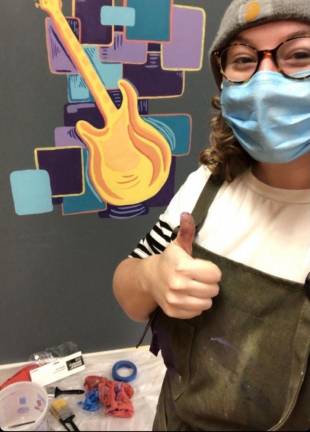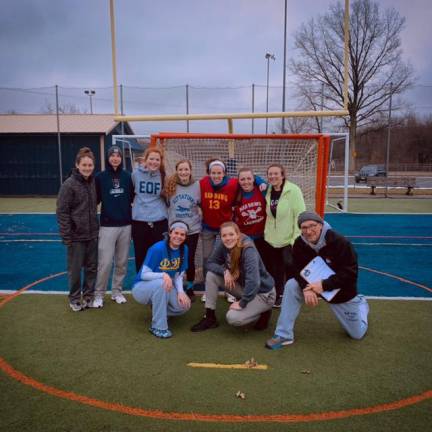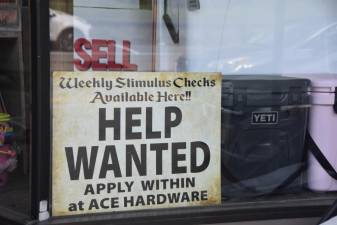The unemployed: ‘I really don’t want to pump gas’
Second of a two-part series. Some take a sabbatical from high-stress jobs; others can’t find one that suits their skills.


“I’m antsy to get to work, but I don’t want to go back to the retail jobs I’ve done,” said Leighann McPartland, 24, of Pine Bush, N.Y.
An art and art history major, McPartland graduated from SUNY Oswego last May at the height of the pandemic – unlucky timing. By the time the world began to reopen, her brief window of opportunity to land internships aimed at recent graduates had shuttered, dimming her hopes of one day illustrating comic books or releasing her own childrens’ books.
“I’ve worked in gas stations, I’ve worked in retail, I’ve worked in shipping. I’m not great in customer service, I’ve come to find. I really want to find something I’m good at. I’m just kind of making it up as I go.”
Looking for work. Or not
According to a Straus News poll of out-of-work readers, 40 percent said they’ve been pounding the pavement, but, like McPartland, striking out finding jobs in their field.
Another third did not plan to go back to work in the near future, citing reasons from health worries, to childcare or eldercare quandaries, to the issue that has turned into the elephant in the room: they are collecting as much or more in boosted unemployment as they made working.
As jobless rates hover at 6.1% and state unemployment coffers run dry, 24 Republican-led states have moved to cancel federal unemployment benefits early. Four of those will replace the $300 weekly checks with return-to-work bonuses.
Connecticut is simply offering a $1,000 “signing bonus” to the first 10,000 jobless residents to get back to work, “to make sure work is worth your while,” said Gov. Ned Lamont.
Pennsylvania is restarting its work-search requirement on July 18, obliging unemployment recipients to prove that they have looked for work during the previous week.
New York never waived those requirements. New Jersey is not planning to reinstate them yet.
“The overwhelming number of folks who have been hit economically, particularly with job loss in this pandemic, have suffered enormously, and so the benefits overwhelmingly are needed for them and for their families,” said New Jersey Gov. Phil Murphy in May. He called the labor shortage “a passing reality. This is not going to be the case forever.”
‘I just don’t get it. I’m trying to get back to work’
McPartland has been freelancing throughout the pandemic: painting a mural for a café, making album art for musicians and taking about 30 commissions to draw cartoon icons for people to use on their social media pages.
But cobbling together piecemeal gigs doesn’t bring in enough to support herself long-term. Nor does the portraiture work, though fun, really fulfil her ambitions. The mural was a great gig, “but I know local businesses have suffered and a mural seems an unnecessary expense,” she said.
Because McPartland worked as a student employee at her college dining hall, she collected unemployment for three months. Now she ponders her next move.
She deferred her acceptance to the School of Visual Arts, wary of shelling out for a second round of college tuition at $50,000 a year to go into a field where a steady paycheck is far from a guarantee. SVA alums make an average salary of just under $30,000 two years after graduation, according to college website niche.com.
Rethinking college choices
McPartland expected that after four-plus years studying art, she’d become an artist, and found herself feeling guilty and hopeless as her enthusiasm to make art waned in step with her job disappointments. But with one job application after another going unanswered, she’s been kicking herself for her choice of major. She should have at least double-majored in communications or something.
“All of the entry level positions seem to require five-plus years of professional experience,” she said. “In what way is that entry level?”
Sparked by something she saw on YouTube, she completed an English-teaching certification course in April, “which kind of reinvigorated my drive.”
Now, McPartland is thinking of teaching English as a second language in South Korea, Asia having caught her fancy in several art history classes. She can bring art into her teaching, she thinks, and the job she has her eye on comes with a free apartment.
“It definitely is something I would have never considered before the pandemic,” she said, “but now I feel like I want to experience whatever I can with how things can change in an instant.
The school of hard knocks
Harry Shortway, president of the Vernon Township Council, is a former police officer, high school history teacher and mayor of Vernon, N.J. – credentials that are getting him nowhere in his job search.
“I know employers are having trouble finding workers. I just don’t get it,” he said. “I’m trying to get back to work.”
Shortway, 64, has his suspicions that his age is working against him. “’Career-oriented’ is a phrase you hear a lot,” he said. He has applied to at least 30 jobs – in management, government administration, security, even cultivating marijuana for $15 an hour.
Occasionally he’ll get a second interview.
“Nothing against people who do, ‘cause you’ll see older males my age pumping gas. I really don’t want to do that, you know?” he said. “I want to deal with teamwork, real problem-solving,” he said. “I think I still have most of my wits about me. I like difficult problems. I did it all my life, being a cop. The last seven years I ran the detective bureau.”
He may not have finished his master’s degree, he said, but along with a BA in criminal justice, “I went to the school of hard knocks.”
He’s been keeping busy doing what he loves, coaching girls’ lacrosse and raising cattle and hops on his hobby farm, the hops destined for his son’s brewing operation down south. But finances are getting tight, living on his police pension and a pair of stipends for coaching and running the town council.
“You’ve gotta make your bills, whether it’s your mortgage, your taxes,” he said. He’s not eligible for federal unemployment because he wasn’t earning a salary when the pandemic hit, nor is his wife.
Lately, Shortway and his wife have been starting to think outside the box. “I played with the idea of going south,” he said, to work for his son’s fast-growing brewery in North Carolina, maybe doing sales or delivery. “He’s having the same problem as everyone else finding workers.”
But though they have grandkids up north and down south, three of the Shortways’ four grown children live in the New Jersey area. “So we don’t want to leave three out of four. You gotta play your batting averages,” he said. “Maybe next year we’ll start renting a place. It all depends how this works out.”
Thanks but no thanks, say service workers
The food service and retail industries are having a particularly rough time finding help right now. The dogfight for workers has unleashed a rising tide of wages from mom and pop cafes to profit-churning behemoths like Amazon, McDonald’s, Chipotle and Walmart.
We spoke to former workers in the food and retail sectors about their old jobs and why they’re reluctant to return, granting them anonymity so they could speak freely.
Michael Lamb*, 43, worked in a retail job in Monroe, N.Y., for three years, and liked it until March 2020 rolled around. As the village of Kiryas Joel’s COVID-19 infection rate skyrocketed, fear notched up at the store, where many customers were from the nearby Hasidic community. Four of his co-workers tested positive. One who came in sick was put on computer training for the day, said Lamb, rather than being sent home. Lamb gave his two weeks’ notice, planning to take a leave of absence for six months.
He never went back. Why would he?
“With the unemployment I make as much or maybe even more than I would working in a store,” he said.
Giving people unemployment for this long was a mistake, he believes. “In retail, you do not get 40 hours a week. You are lucky to get more than 25 with the minimum wage of a lot of stores going to $15 an hour,” he said.
He’s planning to look for another job in retail in September, when the federal checks stop coming. “I can see why people aren’t going back to work yet,” he said.
Being home has been a once-in-a-lifetime opportunity to spend sustained time with his wife and daughter. Both are office workers who’ve been working remotely since last March, and will stay that course at least through September.
Meanwhile, Lamb is among the army of DIYers tackling projects that have long languished on the to-do list. He cleaned out his garage and made some cash hosting an “online garage sale” where people purchased with a click or made appointments to come browse. By the time he has to return to work in September, it will be a year and a half’s sabbatical.
‘Like doing Thanksgiving on a daily basis’
Natasha Grove* had a high-pressure career in the city before she decided she wanted a quieter life. She answered a help wanted ad at an area restaurant, landing in the kitchen.
So began a career that was, on the one hand, fulfilling at a basic human level: “I mean, you get to feed people, everyone needs to eat.”
On the other hand, the job was non-stop, all-in-all-the-time with no breathing room. “It’s kind of like doing Thanksgiving on a daily basis. It’s all the pressure and stress of Thanksgiving every single day.”
Well before COVID, hiring was rough, so restaurant jobs were going unfilled, the responsibilities absorbed by the remaining staff.
“There was no one to hire,” said Grove, “at which point every time you’re down a position that just never gets filled, and you go a year or two years and the position never gets filled, that position gets split. So someone who was already doing two jobs is now doing three jobs. And it just like wears you down. There’s no coverage, because you’re already covering someone else.”
In the end, the job became almost as stressful as her former one – creating the same work-life imbalances she’d been trying to correct – though a lot less remunerative.
“I was fortunate enough that by the time I got here, I had already had a career and stuff like that: my house is paid off, my car is paid off,” she said. “The problem being, if I needed a new car it was going to be like, how do I buy a new car?”
She cannot imagine doing the hot, often cranky and overcrowded kitchen dance with the added germ-fear-factor of the pandemic. “I’m already having sort of agoraphobic tendencies,” she said. “I just feel for people. I can’t imagine being the mask police on top of the stress, and then everything is understaffed.
“Of course, like, the public is exhausted, too,” she added. “Most people aren’t trying to be a pain in the ass or whatever, but fighting with people over masks and staying distanced and stuff like that. And then trying to keep a kitchen clean in normal times is really difficult, there’s just so much going on. And like your staff is just all kind of on top of each other,” she said. “I can’t imagine being in a kitchen wearing a mask. Cause you’re wearing gloves anyway, which is not a comfortable thing.
“They become second nature but it’s kind of miserable when it’s 100 degrees and then wearing a mask on top of that? she said. “Yeah. I don’t know.”
As Americans, we’ve been forged in the fire of the free market, but it’s been a hell of a year for reassessing priorities. “I feel that I need to focus more on my home life than my work life, having always been a workaholic,” she said. “I always start with this, ‘ah it’s only going to be a part-time job,’ and then you’re working 60 hours a week.”
Still, thrifty as she can be, at some point she’s going to have to go back, she said.
As for plans?
“I have no idea, absolutely no idea,” she said, laughing. “I guess I don’t know what I’m going to do when I grow up.”
Editor’s note: *pseudonym
